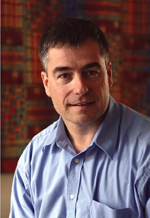Paying new mind
Tackling mental health in the developing world

Talk about the problems of the developing world, and images of poverty, AIDS, malaria, and malnutrition come to mind. Mental health is rarely mentioned.
“Mental health is the last, great neglected area of international health,” says Paul Bolton, an associate professor of international health at the School of Public Health. “Mental health problems are among the largest causes of disability in the world, and yet the programs in developing countries are small, isolated, and don’t have much money. But what’s worse, when they’re done, they’re almost never evaluated, so we don’t even know what these programs do for people, or even if they do any good.”
To help fill that gap, Bolton and his colleagues Judith Bass, Laura Murray, and Theresa Betancourt at the school’s Center for International Health and Development (CIHD) have formed the Applied Mental Health Research Group (AMHR). The group is designing and testing mental health interventions, and the initial results from Africa are remarkably positive: low-cost programs with high success rates. Now they are spreading the word on the need to evaluate these programs, publishing manuals on their evaluation methods, and helping others replicate their work.
Mental health issues, Bolton says, are in some respects even more devastating than physical health problems. People with severe mental health issues are usually dysfunctional for a long time, he says, contributing little to their families and yet using even more resources than the healthy.
Help them and you improve lives in more than one respect. “With mental health, if it’s a severe disorder, you’re not only talking about mental dysfunction but also physical dysfunction, social dysfunction, and stigma,” he says. “So the functional effects of the mental illness are much more broad-ranging than those of physical disorders across all human activity.”
But how to help? Studies on mental health in Africa, where Bolton and his AMHR team wanted to work, were practically nonexistent, so they started from scratch. Their first step was a quick qualitative study of local mental health issues. “It’s basically applied anthropology,” he says. “The first thing we do is use these methods to see how people view mental health.” For example, in one site in southern Uganda, the most common symptoms local people described closely matched the standard Western definition of depression. From what he and his colleagues knew of the effective therapies for the problems described — drugs, cognitive behavioral therapy, and interpersonal psychotherapy (IPT) — Bolton judged that IPT would work best. People in Uganda talk with one another about their issues, he says, “and they solve things from a relational viewpoint. That’s exactly what IPT does.”
In 2002 local Ugandans were recruited as group therapy facilitators and trained to use a form of group IPT developed by a Columbia University team. With 248 people from 30 villages judged to be suffering from major depression, Bolton and his colleagues set up 30 groups of men and women, half receiving weekly 90-minute psychotherapy sessions for 16 weeks, the other half receiving none. At the end of the period, the team reinterviewed the participants and found that those who received IPT were significantly less depressed than the control group.
Equally notable was that 6 months after the intervention ended, 14 of the 15 IPT groups were still meeting without facilitators, having transformed themselves into “little economic support groups, helping themselves by lending money and helping people go into business,” Bolton says. “So the rumor had gone around that these were actually success groups: people were trying to get into them. These individuals had gone from being depressed and low-functioning to being seen in their communities as examples of high-functioning people. That was really great.”
The AMHR team hopes the manuals they’ve written will encourage and help others to evaluate their programs “so that we can begin to sort out what works and what doesn’t, as a basis for progress,” Bolton says. “One manual is about how you do accurate assessments across cultures.” As in Uganda, he starts with qualitative methods — using open-ended interviews — and from those results develops questionnaires to measure local mental health problems. “We also use qualitative methods to test the questionnaires — to see whether they work accurately.” Afterwards, they use the questionnaires in quantitative assessments to determine the extent of the problems and the rate of change after interventions.
They have published their findings, but that’s only the first step, he says. A mentor at Johns Hopkins once told Bolton that “when you do a study and publish the data, you’ve done half your job. You have to figure out what people are going to do with the information. Is it actually going to help people somehow?” In this case, Bolton’s agreement with the nongovernmental organizations that fund his work has stated explicitly that if an intervention works, the NGOs are obliged to begin programs based on the interventions and that the control group will be the first to participate.
Now he’s starting similar collaborative programs with humanitarian organizations in other countries, ranging from Haiti to Georgia, as well as another project in Uganda, this time with children in the country’s war-torn north. “I just wish we could do it faster,” Bolton says. “I think we’re at the phase where we’re only beginning to do what we want to do, but it’s slow. I’d like to do it in many places at once, and go faster.”
The urgency Bolton feels is related to what he knows of the seriousness of the situation. In his original survey in southern Uganda, some 20 percent of adults questioned had clear symptoms of depression. He has found similar results in Rwanda. “That,” he says, “is a huge mental health problem.”
This article first appeared in the Fall 2005 Health Sphere.